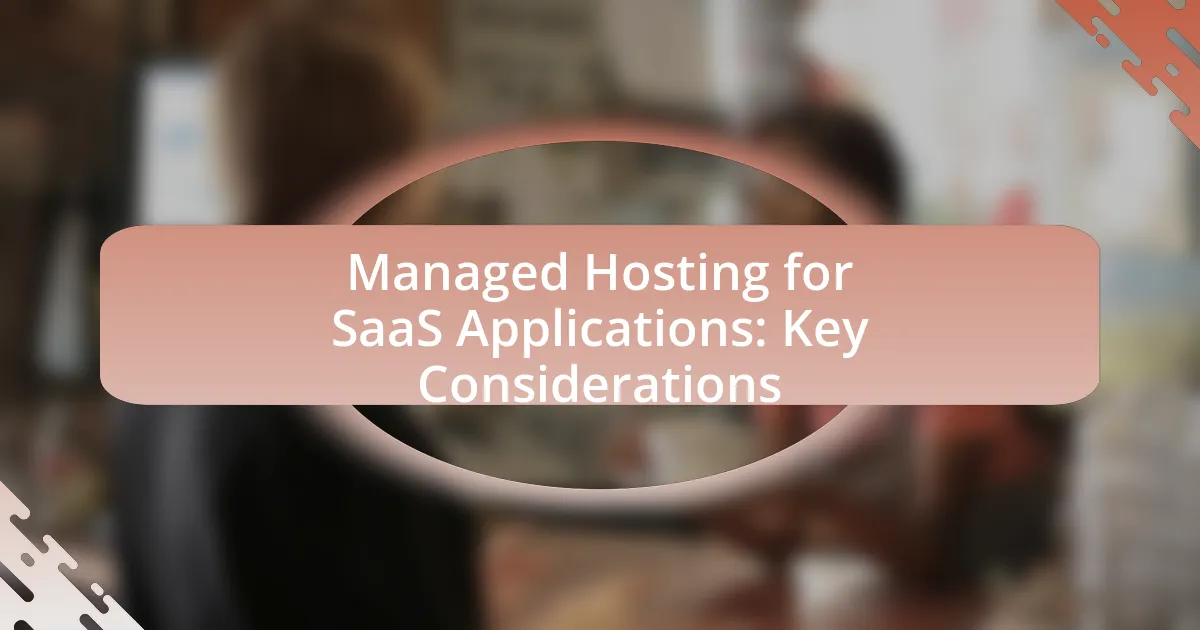Managed hosting for SaaS applications is a service model where third-party providers manage the infrastructure, security, and maintenance of software applications delivered as a service. This article explores the differences between managed hosting and traditional hosting, highlighting key features such as scalability, security, and performance optimization. It also discusses the advantages of managed hosting, including enhanced reliability and cost benefits, while addressing potential challenges like vendor lock-in and security concerns. Additionally, best practices for optimizing managed hosting and tips for selecting the right provider are provided, ensuring businesses can effectively leverage managed hosting for their SaaS applications.

What is Managed Hosting for SaaS Applications?
Managed hosting for SaaS applications is a service model where a third-party provider manages the infrastructure, security, and maintenance of software applications delivered as a service. This model allows businesses to focus on their core operations while the provider ensures optimal performance, scalability, and security of the applications. Managed hosting typically includes services such as server management, data backup, and technical support, which are essential for maintaining the reliability and efficiency of SaaS applications.
How does Managed Hosting differ from traditional hosting?
Managed hosting differs from traditional hosting primarily in the level of management and support provided. In managed hosting, the service provider takes care of server management, maintenance, security, and updates, allowing businesses to focus on their core operations. In contrast, traditional hosting typically requires users to manage their own servers, including software installations, security measures, and troubleshooting, which can lead to increased complexity and resource allocation. This distinction is crucial for SaaS applications, where uptime and performance are critical; managed hosting often includes features like automated backups and proactive monitoring, which enhance reliability and reduce downtime compared to traditional hosting setups.
What are the key features of Managed Hosting for SaaS?
The key features of Managed Hosting for SaaS include scalability, security, performance optimization, and support services. Scalability allows SaaS applications to handle varying workloads efficiently, enabling businesses to grow without infrastructure limitations. Security features, such as data encryption and compliance with regulations like GDPR, protect sensitive information. Performance optimization ensures fast load times and minimal downtime, which is critical for user satisfaction. Additionally, comprehensive support services provide technical assistance and maintenance, allowing businesses to focus on their core operations while relying on experts to manage the hosting environment.
Why is Managed Hosting important for SaaS applications?
Managed hosting is important for SaaS applications because it ensures optimal performance, security, and scalability. SaaS applications require reliable uptime and fast response times, which managed hosting provides through dedicated resources and expert management. Additionally, managed hosting services often include robust security measures, such as firewalls and regular updates, which protect sensitive user data. According to a report by Gartner, 70% of organizations using managed hosting experience improved security and compliance, highlighting its critical role in safeguarding SaaS applications.
What are the advantages of using Managed Hosting for SaaS?
Managed hosting for SaaS offers several advantages, including enhanced performance, scalability, and security. Enhanced performance is achieved through dedicated resources and optimized server configurations, which ensure faster load times and improved user experience. Scalability allows SaaS providers to easily adjust resources based on demand, accommodating growth without significant downtime or infrastructure changes. Security is bolstered by managed hosting providers who implement advanced security measures, including regular updates, monitoring, and compliance with industry standards, which protect sensitive data and maintain customer trust. These advantages collectively contribute to a more reliable and efficient SaaS application delivery.
How does Managed Hosting enhance performance and reliability?
Managed Hosting enhances performance and reliability by providing dedicated resources, expert management, and optimized infrastructure. This setup ensures that applications run on high-performance servers with minimal downtime, as resources are not shared with other users, leading to faster load times and improved user experiences. Additionally, managed hosting services often include proactive monitoring and maintenance, which helps identify and resolve issues before they impact performance. According to a study by Gartner, organizations using managed hosting can achieve up to 99.99% uptime, significantly reducing the risk of service interruptions compared to traditional hosting solutions.
What cost benefits can be realized with Managed Hosting?
Managed hosting can realize significant cost benefits by reducing the need for in-house IT infrastructure and personnel. Organizations can save on capital expenditures related to hardware, software, and maintenance, as managed hosting providers typically offer these services as part of their packages. Additionally, managed hosting can lead to lower operational costs through improved resource allocation and scalability, allowing businesses to pay only for the resources they use. According to a study by Gartner, companies can reduce their IT costs by up to 30% when utilizing managed hosting services compared to maintaining their own data centers.
What challenges might arise with Managed Hosting for SaaS?
Managed Hosting for SaaS can present several challenges, including scalability issues, vendor lock-in, and security concerns. Scalability can become problematic if the managed hosting provider cannot accommodate rapid growth or fluctuating demand, potentially leading to performance degradation. Vendor lock-in occurs when businesses become overly dependent on a specific provider’s infrastructure and services, making it difficult to switch to another provider without incurring significant costs or disruptions. Security concerns arise from the shared nature of managed hosting environments, where vulnerabilities in one application could potentially expose others, necessitating robust security measures and compliance with regulations.
How can security concerns be addressed in Managed Hosting?
Security concerns in Managed Hosting can be addressed through a combination of robust data encryption, regular security audits, and comprehensive access controls. Implementing end-to-end encryption ensures that data is protected both in transit and at rest, significantly reducing the risk of unauthorized access. Regular security audits help identify vulnerabilities and ensure compliance with industry standards, such as ISO 27001, which provides a framework for managing sensitive information securely. Additionally, comprehensive access controls, including multi-factor authentication and role-based access, limit user permissions to only what is necessary, further enhancing security. These measures collectively create a secure environment for hosting SaaS applications, mitigating potential threats effectively.
What are the potential downtime risks associated with Managed Hosting?
The potential downtime risks associated with Managed Hosting include hardware failures, network outages, and software issues. Hardware failures can lead to server crashes, resulting in service interruptions; for instance, a study by Gartner indicates that 98% of organizations experience at least one hour of downtime annually due to hardware malfunctions. Network outages can disrupt connectivity, affecting user access to applications; according to a report by the Uptime Institute, 70% of downtime incidents are linked to network issues. Software problems, such as bugs or misconfigurations, can also cause significant downtime, with a survey by ITIC revealing that 33% of businesses report downtime due to software failures. These risks highlight the importance of robust infrastructure and proactive management in Managed Hosting environments.
How can businesses choose the right Managed Hosting provider?
Businesses can choose the right Managed Hosting provider by evaluating their specific needs, including performance, scalability, security, and support. Identifying the required resources, such as bandwidth and storage, helps in selecting a provider that can meet those demands. Additionally, assessing the provider’s reputation, customer reviews, and service level agreements (SLAs) ensures reliability and accountability. According to a 2022 survey by HostingAdvice, 70% of businesses prioritize customer support and uptime guarantees when selecting a hosting provider, highlighting the importance of these factors in decision-making.
What criteria should be considered when evaluating providers?
When evaluating providers for managed hosting of SaaS applications, key criteria include reliability, scalability, security, support, and cost. Reliability ensures that the provider maintains high uptime and performance levels, which is critical for user satisfaction and business continuity. Scalability allows the hosting solution to grow with the application, accommodating increased traffic and resource demands without significant downtime or performance degradation. Security measures, such as data encryption and compliance with regulations like GDPR, protect sensitive information and build trust with users. Support services should be responsive and knowledgeable, providing assistance when issues arise. Finally, cost-effectiveness must be assessed to ensure that the pricing aligns with the budget while delivering the necessary features and performance. These criteria collectively ensure that the chosen provider can effectively support the operational needs of a SaaS application.
How important is customer support in selecting a Managed Hosting provider?
Customer support is critically important in selecting a Managed Hosting provider. Effective customer support ensures that issues are resolved quickly, minimizing downtime and maintaining service reliability, which is essential for SaaS applications. According to a survey by Zendesk, 82% of customers have stopped doing business with a company due to poor customer service, highlighting the direct impact of support quality on customer retention and satisfaction. Additionally, a reliable support system can provide technical assistance and guidance, which is vital for businesses that may lack in-house expertise. Therefore, prioritizing customer support when choosing a Managed Hosting provider is essential for operational success and customer satisfaction.
What are the best practices for optimizing Managed Hosting for SaaS?
The best practices for optimizing Managed Hosting for SaaS include ensuring scalability, implementing robust security measures, and utilizing performance monitoring tools. Scalability is crucial as it allows the hosting environment to adjust resources based on user demand, which is essential for SaaS applications that may experience fluctuating traffic. For instance, a study by Gartner indicates that 70% of SaaS companies prioritize scalability to enhance user experience and operational efficiency.
Robust security measures, such as data encryption and regular security audits, protect sensitive customer information and maintain compliance with regulations like GDPR. According to a report by McKinsey, 60% of SaaS businesses that invest in security see a significant reduction in data breaches.
Utilizing performance monitoring tools helps in identifying bottlenecks and optimizing resource allocation, ensuring that the application runs smoothly. Research from Forrester shows that companies using performance monitoring tools can improve application uptime by up to 30%.
These practices collectively enhance the reliability, security, and efficiency of Managed Hosting for SaaS applications.
How can businesses ensure scalability with Managed Hosting?
Businesses can ensure scalability with Managed Hosting by selecting a provider that offers flexible resource allocation and automated scaling features. This allows businesses to adjust their server resources based on demand, ensuring optimal performance during peak usage times. For instance, many managed hosting services utilize cloud infrastructure, which can dynamically allocate additional resources such as CPU, memory, and storage as needed. According to a report by Gartner, organizations that leverage cloud-based managed hosting can scale their operations up to 70% faster than traditional hosting solutions, demonstrating the effectiveness of this approach in meeting fluctuating demands.
What monitoring tools are essential for Managed Hosting performance?
Essential monitoring tools for Managed Hosting performance include application performance monitoring (APM) tools, server monitoring tools, and network monitoring tools. APM tools like New Relic or Dynatrace provide insights into application performance, helping identify bottlenecks and optimize user experience. Server monitoring tools such as Nagios or Zabbix track server health metrics, ensuring uptime and resource optimization. Network monitoring tools like SolarWinds or PRTG monitor network traffic and performance, allowing for quick identification of issues that could affect hosting performance. These tools collectively ensure that Managed Hosting environments operate efficiently and reliably, supporting the performance needs of SaaS applications.
What common pitfalls should be avoided in Managed Hosting for SaaS?
Common pitfalls to avoid in Managed Hosting for SaaS include inadequate scalability, poor security practices, lack of support, and vendor lock-in. Inadequate scalability can hinder growth, as many SaaS applications require the ability to handle increasing user loads; thus, choosing a provider that offers flexible scaling options is essential. Poor security practices can lead to data breaches, which can damage reputation and lead to legal issues; therefore, selecting a host with robust security measures, such as encryption and regular audits, is crucial. Lack of support can result in prolonged downtime and unresolved issues, making it vital to ensure that the hosting provider offers 24/7 support. Lastly, vendor lock-in can limit future growth and flexibility; thus, opting for a provider that allows easy migration to other platforms can mitigate this risk.
How can businesses prevent vendor lock-in with Managed Hosting?
Businesses can prevent vendor lock-in with Managed Hosting by ensuring they choose providers that support open standards and offer data portability. By selecting a managed hosting provider that allows easy migration of applications and data, businesses can maintain flexibility and avoid dependency on a single vendor. Additionally, negotiating contracts that include exit strategies and clear data retrieval processes further safeguards against lock-in. Research indicates that companies utilizing open-source technologies and multi-cloud strategies experience reduced risk of vendor lock-in, as these approaches facilitate easier transitions between service providers.
What are the risks of underestimating resource needs in Managed Hosting?
Underestimating resource needs in Managed Hosting can lead to significant operational risks, including performance degradation, service outages, and increased costs. When resource requirements are not accurately assessed, applications may experience slow response times or downtime, negatively impacting user experience and customer satisfaction. For instance, a study by Gartner indicates that 98% of organizations report that a single hour of downtime can cost over $100,000, highlighting the financial implications of inadequate resource allocation. Additionally, insufficient resources can hinder scalability, making it difficult for businesses to adapt to growing user demands or traffic spikes, ultimately affecting competitiveness in the market.
What practical tips can enhance the effectiveness of Managed Hosting for SaaS?
To enhance the effectiveness of Managed Hosting for SaaS, prioritize scalability, security, and performance optimization. Scalability ensures that the hosting environment can accommodate growth in user demand without service interruptions, which is crucial for SaaS applications that may experience fluctuating traffic. Security measures, such as regular updates, firewalls, and data encryption, protect sensitive user information and maintain compliance with regulations like GDPR. Performance optimization techniques, including load balancing and content delivery networks (CDNs), improve application speed and reliability, leading to better user experiences. These practices are supported by industry standards, such as the Cloud Security Alliance’s guidelines, which emphasize the importance of robust security and performance in cloud services.


